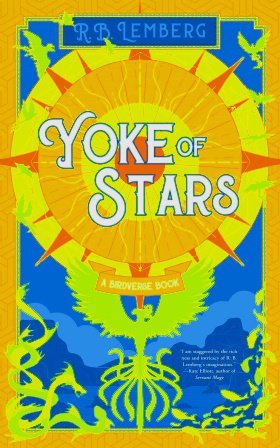Then the youth stopped. They waved their hands. The desert’s embrace opened for them, and thin long structures of petrified wood rose from the depths of the sandy ground, forming a simple, vertical frame of a loom. Then the thread of sand began to weave itself, while the youth hummed and sang without words. It went on and on, as the sun sank beyond the horizon. I stood there, immovable, witnessing.
When they finished, the loom dissipated into the dying orange light. The youth held out a small carpet.
“For me?” I asked. They thrust it into my hands. Sand, a feeling of motion, and these roses—each petal glowed, and their thorns hung with drops of blood. I rolled the carpet into a thin bundle, not quite understanding the turmoil I felt.
I asked, “What can I give you in return? Do you want—can you even tell me? Do you want magic? Power? Do you want water?”
The youth did not respond.
I dug into a small bag I carried, and offered them treasures I found wandering in the desert—a small, bejeweled scarab beetle covered in ancient letters I could not read, a fragment of cloth woven of silver and beaded with moonstone, a piece of old dried cake I got in the last encampment.
The youth took the cake and was chewing on it when shouts came from the northeast, and a small crowd of angry people ran toward us, their deepname structures blazing in the dusk. There were mostly young women my age; older people trailed them, and at least four lanky and indignant-looking goats.
One of them, a young woman, their leader and seemingly magicless, brandished a spear.
“Kimi! Kimi, come back!! Did he hurt you? I swear, if you hurt him, I will—”
The woman shouted in Iyari, yet others in Surun’. I could not understand much, but gathered that the youth was prone to wandering away, that the angry young woman was the straying youth’s older sister. Her lovers and companions trailed her, all shouting of my criminal intent, how I lured the child out to the desert to ravish them. Kimi—that was the youth’s name—ran back to their side, laughing and speechless. They would not be able to say anything in my defense, or in their own.
Rage engulfed me. How dare they imply—yes, I was a criminal, but I have never coerced anyone in my life, let alone a person who wasn’t of age. I took many lovers, yes, but I would never force anyone. Consent is everything to me.
My rage flared black, and viscous, and endless. With clouded eyes I beheld these people as outlines of heat; all their magic and spears would be as nothing before me.
Something else occurred to me then.
Kimi’s sister defended them.
At that moment, my vision clouded with envy and my throat as painful as shards, I saw my futures diverge. I would fight this crowd—kill them all—leave only the youth unharmed. Then I would wander the desert wounded and silently screaming until I came to Ladder’s court and threw myself into the Orphan.
Or I could refuse to do violence.
I bit my cheeks bloody before I was done, then turned on my heels and retreated into the desert, my deepnames obscuring my steps in the whirlwinds of dust and the darkening sky.
Only later I realized that I still held the rolled-up carpet. Later yet, I learned that it could fly, not too high above ground, but it carried me.
So I floated southeast, and came to the ancient city of Che Mazri, the capital of the Great Burri Desert, and met my lover.
Everyone wants something from me. Even you, Stone Orphan, even though I’m not sure yet what it is. Except Kimi. I think they did not want anything, that youth with their gaze of wonder who saw only soulbirds and flowers. My lover in Che Mazri certainly wanted something from me, and they made every excuse under Bird’s wing to brush away my crime. To cut those parts of me off.
Perhaps my lover wanted to care for me when others would not, but I do not want it. Not like that.
Nobody understands how every moment I must fight myself, how I must guard myself against my own rage, and in this place—Ladder—he feeds it. I told him I do not submit, but he knows me. At his command, I have killed. “To train,” he says. “is to learn.” Is it right to kill at his command when it’s wrong to kill out of anger? He says we kill only the people that the Orphan already marked as its own.
I had sought every lore that meant I would best my enemies and live. But now I ask myself, do I truly want every learning? At what price? My thoughts tangle, dripping blood. So I put this carpet under my head every night, to remember the soulbirds.
“That’s it,” I say. “That’s how he told it to me.”
Ulín’s eyes are closed when she asks, “How did he leave?”
“Oh, there was a training battle, in the second circle. Students who make it this far rarely kill each other, but Ladder was in a mood that day.”
An exit is made
When the Raker defeated his opponent, Ladder told him to finish the job.
The Raker kicked the other student away from him. Looked up at the Headmaster.
“No.”

























